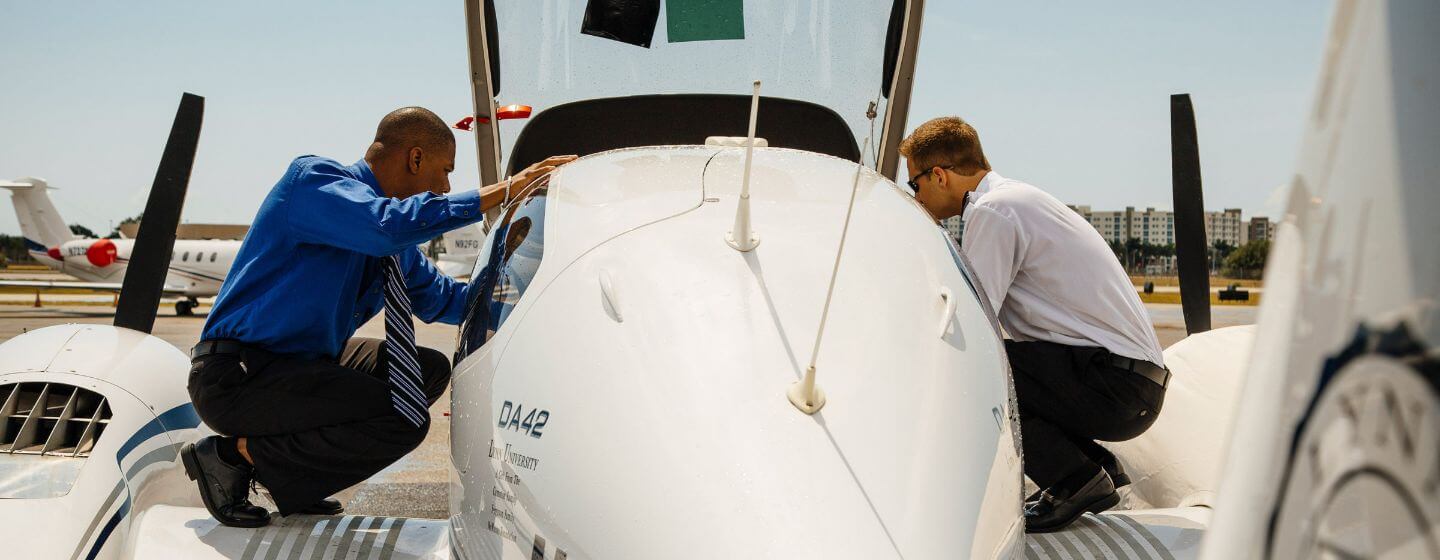Anatomy of airport operations: Who runs an airport?

Keeping flights on time and passengers getting to their destinations requires much more than pilots and flight attendants. For a complex system like an airport to run smoothly, many roles in aviation operations are involved, including air traffic controllers and airport operations managers.
Careers in airport operations look bright for the future. According to the Department of Labor’s CareerOneStop site, there will be an 8% growth in airport operations jobs by 2031.
>> Read: Aviation career guide
Jennifer Torres, assistant professor at Lynn University’s College of Aeronautics, explains more about airport operations, what qualities make someone good for an airport operations career and how to enter the field.
What is airport operations?
Every airport, no matter its size, needs to coordinate its operations to make sure the experience is as smooth as possible for everybody. From ticketing to Transportation Security Administration (TSA) to baggage handling to parking, everything needs to come together to be cost-effective, efficient, safe and pleasing to flyers. This is where airport operations comes in.
“Airport operations oversees everything—from aspects of public relations, marketing and finance to the running of the airport,” Torres says. “Planning is crucial for airport operations.”
CareerOneStop says airport operations duties include:
- Applying knowledge of weather information
- Coordinating air-traffic control and maintenance personnel communications
- Dispatching
- Implementing safety procedures for airfields
- Maintaining and monitoring flight records
- Using airfield landing and navigational aids
The complexity of the functions increases with the size of the airport.
“The larger airports have higher standards to meet because they deal with all the airlines, international flights and more. They’re highly regulated,” Torres says. “But even on the general aviation side, small airports have their finance team, security team, operations team and marketing.”
What are some common airport operations jobs?
Airport operations are commonly divided into four groups:
- Airside operations - These are jobs to oversee the airfield, ramps, safety and security of the airport.
- Billing and invoicing - Those in billing and invoicing handle both aeronautical and non-aeronautical revenue.
- Ground operations - These are customer-service roles overseeing the concourses, properties, roadways and terminals.
- Information management - This is the collection and distribution of daily flight information.
Each of these provides a wide range of job opportunities, Torres says. She says these titles are typical in an airport:
- Airport manager
- Airport operations coordinator
- Airport operations officer
- Aviation project manager
- Director of aviation properties, airline air affairs and air service development
- Manager of public and external affairs
“Airports even have functions to protect wildlife,” she says. “At the Hartsfield-Jackson Atlanta International Airport, there’s a biologist on staff. They work out what types of birds there are, what vegetation to plant, what landscaping is needed and so on.”
There are also positions dealing with advertising, marketing, public relations and social media. “If you’re great at public speaking or advertising, you can be involved with an airport, too. That is a great position to grow in,” Torres says. “Airports can also have writers on staff because they’re constantly communicating with the public.”
What skills are needed to work in airport operations?
Torres says there are several skills that can help you start a career in airport operations.
“Some of the skills include problem-solving, thinking on your toes, knowing how to work the situation without overstepping regulations, and understanding procedures that your company has,” Torres says.
She also lists other typical skills:
- Ability to multitask
- Adapting to a changing environment
- Attention to detail
- Computer skills
- Research
- Speaking
- Understanding multiple legal implications (city, county, state and federal)
- Writing
How can someone begin a career in airport operations?
Airport operations professionals typically have a four-year degree in aviation, business administration, safety engineering or a related field. They often have certification as an Accredited Airport Executive (A.A.E.) from certifying bodies such as the American Association of Airport Executives (AAAE).
Airport operations executives also need to understand financial, planning and operational airport requirements.
Torres says that internships are also a valuable way to gain knowledge.
“I think the internships are key, and they're available through the AAAE website,” she says. “There are only a few right now, but [individual] chapters list the internships, too.”
Although Torres has an extensive background in aviation—and learned how to fly a plane at age 17—she says having a pilot’s license isn’t necessary to go into airport operations.
“You could always talk to pilots and perhaps go up on flights, but you don't need to be a pilot,” she says. “However, it could help you understand the environment and what you're in charge of. It does help.”
Find your future in airport operations at Lynn University
In Lynn University’s Online Bachelor’s Degree in Aviation Operations program, you’ll gain a valuable blend of management and operational skills to advance in the general and commercial aviation areas.
In the program, students learn:
- Management, leadership, business analytics and operations management
- Aircraft operations, air traffic basics and aviation technologies, regulations and laws
- Aviation history, airport operations and weather
- Primary flight theory and aviation safety
Find out more about online degrees at Lynn University and reach out today for more information.

